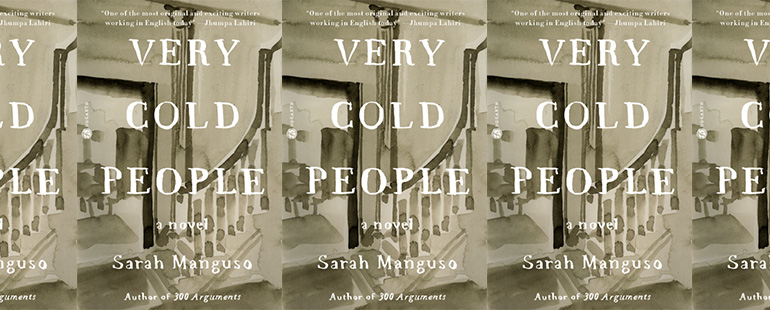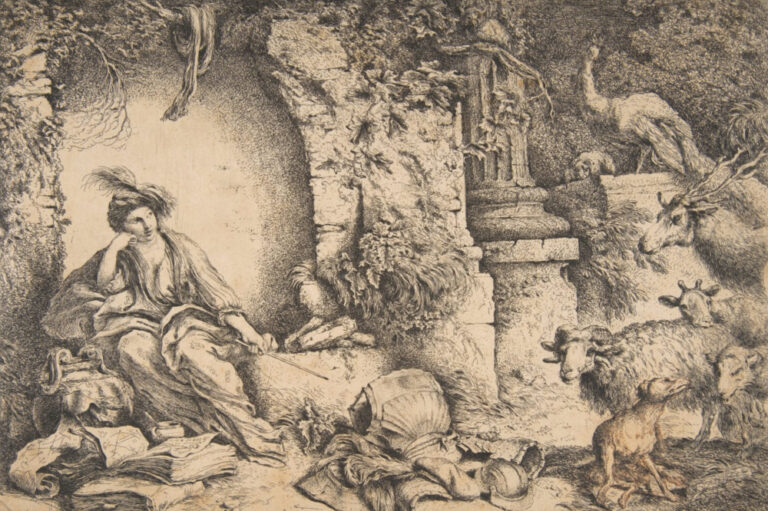The Time of Girlhood in Sarah Manguso’s Very Cold People

Sarah Manguso is obsessed with time. It follows her everywhere. In her work, she writes about all its various faces as if the thing that links each day to the next exists as a mutable entity dependent on a person’s path through life. There is the time of illness in her first nonfiction work, The Two Kinds of Decay (2008), and the time of motherhood in Ongoingness: The End of a Diary (2015). The Guardians: An Elegy for a Friend (2012) meditates on the time of death, or, perhaps more precisely, how death offsets a chain reaction of inescapable time that gives way to, among many things, grief. Sometimes Manguso’s time is disguised as a duality, a choice in which deciding to live one way means giving up the timeline of another. “I’m faced at every moment with two possible lives, and I must choose one without knowing whether I want it, whether it’s worth it,” she writes in 300 Arguments (2017).
In her latest book, her first novel, Manguso returns to the concept of time, only here she meditates on it through the lens of girlhood. Very Cold People, out today, tells the story of Ruthie, a young Italian-Jewish girl growing up in the economically diverse town of Waitsfield, Massachusetts. Manguso herself grew up in a similar town on the east coast, and the duality of a life lived amongst far wealthier peers is another theme that often repeats throughout her work. In Very Cold People, she pays homage to this wealth gap while also illuminating how wealth or a lack thereof doesn’t necessarily mean protection for young girls from a world that’s desperate to objectify and sexualize them as soon as possible.
We’ve all heard the stories, and if you’re a woman, there’s no doubt you have some of your own. Stories about how growing up, there often existed this strange, unexplainable notion that being a girl meant that soon you would be a woman and that being a woman meant making yourself available to men. We learned these things as if through osmosis, so imbedded were they into the fabric of our lives and the lives of the women who raised us, who taught us, who passed us on the street and who had their faces printed in all the popular magazines. We were expected to develop crushes on boys and to let those crushes wash over us like predetermined blankets of purpose. We begged our mothers for make-up before we had even graduated from kindergarten. We made role models out of Disney princesses who languished in bed all day until some strong, handsome man arrived to whisk them away to a new life, a better life of dependence and wealth and so-called love.
Often, our belief in ourselves was dependent on our belief in the boys and men around us. If they liked you, you were doing something right. If not, keep trying. Very Cold People understands this experience, and in Manguso’s capable hands, the story of Ruthie grows out of itself to encompass a world of feminine time in which the most innocent of actions can be mistaken for unwanted attention.
At the book’s start, Ruthie is an elementary school girl. She understands life through the actions of her parents, but it is her mother who has the biggest effect on her. “My mother was always just a woman sitting on an upholstered sofa in 1985,” she says. “She was the protagonist of everything.” At once both cruel and protective, Ruthie’s mother chastises her for refusing to wear a two-piece bathing suit, a choice Ruthie perceives as an attempt to make her “sexy for people to look at.” But she also reprimands Ruthie for innocently talking to a group of men that she meets with her friend Amber on a walk home from school. “My mother scolded me for speaking to them. She seemed less furious than frightened,” she says. It is as if her mother desires to shield Ruthie from the inevitable advances of the boys and men surrounding her, while simultaneously preparing her to be wanted by them. This mixed messaging ultimately plays into Ruthie’s experience of the world, making her childhood one of fraught dichotomies that cause her to struggle with being a child while the rest of the world demands that she grow up.
To be a child is to be free of responsibility and fear. Of course, this is often not the case for many young children, but it’s still a widely accepted belief that childhood should be a sacred, magical time in which the world’s faults remain invisible for as long as possible. When we imagine the childhood of boys, we picture them with scraped knees and grass-stained clothes. They traipse through our minds like little explorers, climbing trees and playing sports, unhindered by the monoliths of caregiving and servitude that girls are busy mimicking through their play with dolls and plastic toy kitchens. Girls, it seems, are always busy being prepared for their place in the world, while boys are only ever tasked with learning to explore it. Girlhood then can be seen as a drastic acceleration of time in which the innocence of childhood is dangerously eclipsed by the notion of women’s work.
There is a scene in Very Cold People that I cannot stop thinking about. Ruthie, still in elementary school, is playing by herself at recess. She is climbing a retaining wall “that separate[s] the courtyard from the schoolyard.” It is a high wall that only continues to get higher the more she climbs, but she is unafraid. It seems as if she is going to make it all the way to the top of this wall that is nearly “a full story off the ground,” but then she abruptly changes her mind and begins her descent. “Partway through my climb a few boys ran up to the wall, giggling, looking under my skirt. They could see the eyelet trim. They might have seen my underwear,” she says. She quickly returns to the ground, her ascent ruined by the perverse curiosity of little boys.
Girls are forced to conform to the societal expectations of women; boys learn to objectify those girls before they even make it to puberty.
The women of Very Cold People teach Ruthie and her friends everything they need to know about their femininity. They offer up make-up for their children to wear for special occasions, and they celebrate the arrival of menstrual periods by doling out pads, tampons, and the very important and often unspoken advice that a period is something to keep quiet about—a banal, reoccurring sentence in the story of your life. But the men of Very Cold People also give their advice to these young girls, as if their opinions on their bodies will somehow empower them or shield them or both. Ruthie’s grandfather becomes incensed at Ruthie’s continuing to wear a long, oversized t-shirt over her bathing suit when spending summers at the pool. “I wasn’t naked underneath,” she says, “but I looked as if I might be.” And just like that Ruthie learns it is her responsibility to shield herself from the lustful, uncontrollable eyes of the men around her.
The girls do their best to listen to the older women around them, and to learn from them. Once in high school, Ruthie’s friend Charlie tells her, “I don’t dress for myself; I dress for boys,” as if the answer to finding a man lies in a woman’s ability to successfully match her skirt to her blouse. Sometimes, the knowledge picked up from the women in these girls’ lives is so discreet that they aren’t even aware they’ve absorbed anything at all. In one particularly poignant scene, Ruthie’s friend Bee unexpectedly gets her period at school and the two girls surreptitiously exchange a pad at their lockers, careful to not let anyone see. When they are finished, they feel as if they’ve “conducted a magic trick,” and, truly, that is what has occurred here. They’ve successfully learned to hide their womanhood from the rest of the world, and for that they feel proud.
As the girls grow older, the men in their lives become more and more predatory, though Ruthie will eventually come to recognize that age doesn’t necessarily matter when it comes to becoming a target for a man’s sexual gratification. So conditioned are these girls to believe that their purpose in life is for men to desire them that when Ruthie’s gym teacher feels her up during her middle school gym class, her first thought is to think, “maybe this is normal.” Ultimately, she decides that it is not, but even though it’s wrong and uncomfortable, she can’t help but feel “that, on some level, he liked me.” Very Cold People is filled with such men, and they exist within the book like pillars of reinforcement, teaching the young girls that their bodies are not their own. “Back then it would have sounded extremist, paranoid, delusional, to say that all attention to girls was tinged with sex,” Ruthie says. “Even now it seems almost unbelievable.” Is this unbelievability born out of the belief that people, men, could not possibly be so brazen with their desire, or is it more that this brazenness has always been there for girls so that by the time they begin to question it, the doubt has already crept in?
To be a girl is to be magical. All at once, you contain multitudes upon multitudes of possibility. The world as you see it is fresh and bright and harmless. Time is experienced as one long strand of glittering expanse that bends to the whims of your playbox. But this time of innocence will soon speed up, no matter how much you or your parents try to shield it from you. Soon, the real world will seep in. You will begin to hear murmurs of expectation and desire, and these murmurs will begin to shape you whether you realize it or not. Maybe a man will be too “friendly” towards you, or the boys at school will start to form opinions of you based on nothing but the proportions of your body. It will become inescapable. And when this happens, no matter if you’re four or fourteen, girlhood as a pure, immutable thing will cease to exist. “My own girlhood felt like something from 1650 even when it was happening,” says Ruthie. “I spent those days feeling half-there, not quite committed to that life.” Because to be a girl is to be raised as a woman, all at once so young and so raw and so ripe.


